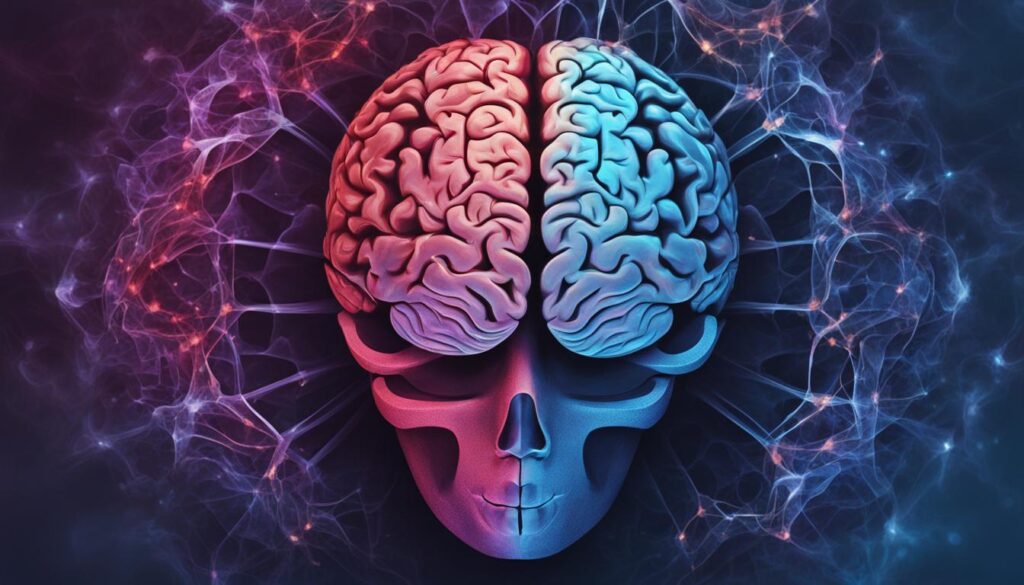Meditation is a simple and effective way to reduce stress and anxiety. It has been practiced for thousands of years and is now commonly used for relaxation and stress reduction. Meditation can help restore calm and inner peace, and it can benefit both emotional well-being and overall health.
There are various types of meditation techniques, such as guided meditation, mantra meditation, mindfulness meditation, and more. Research suggests that meditation can help manage symptoms of anxiety and other medical conditions. By incorporating meditation into your daily routine, you can learn to stay centered, reduce negative emotions, and cope with stress more effectively.
Key Takeaways:
- Meditation is a powerful tool to overcome anxiety and improve well-being.
- Various meditation techniques can be used to manage anxiety, including guided meditation and mindfulness meditation.
- Research supports the effectiveness of meditation in reducing symptoms of anxiety and promoting overall health.
- Incorporating meditation into your daily routine can help you stay centered and cope with stress more effectively.
- Start with short meditation sessions and gradually increase the duration as you become more comfortable.
Understanding Meditation: A Mind-Body Approach to Inner Peace
Meditation is a practice that offers a mind-body approach to finding inner peace and tranquility. By focusing your attention and eliminating the stream of jumbled thoughts, meditation allows you to experience a deep state of relaxation and calm. It provides a space for you to gain a new perspective on stressful situations, build skills to manage stress, increase self-awareness, and focus on the present moment.
Through regular meditation, you can reduce negative emotions, increase creativity, patience, and tolerance, and improve the quality of your sleep. It is also beneficial for managing symptoms of various medical conditions, including anxiety, asthma, cancer, chronic pain, depression, heart disease, and high blood pressure. However, if you have any medical conditions, it’s important to consult with your healthcare provider before incorporating meditation into your treatment plan.
The Benefits of Meditation:
- Reduces stress and anxiety
- Restores calm and inner peace
- Enhances emotional well-being
- Improves overall health
Meditation is not a magical solution, but rather a valuable tool that can change your relationship with anxiety and provide relief.
By understanding the mind-body connection and incorporating meditation into your daily routine, you can learn to stay centered, reduce negative emotions, and cope with stress more effectively. It’s a transformative practice that can bring newfound peace and balance into your life.
Types of Meditation Techniques: Exploring Different Paths to Inner Peace
When it comes to meditation, there are various techniques you can explore to achieve a relaxed state of being and cultivate inner peace. Each technique offers a unique approach, allowing you to find the one that resonates with you the most. Here, we’ll delve into some popular types of meditation techniques:
Guided Meditation
Guided meditation involves forming mental images of relaxing places or situations. It is a great technique for beginners or those who find it challenging to quiet their minds on their own. Through guided meditation, a teacher or a recorded audio guide leads you through the process, helping you focus your attention and visualize a peaceful state.
Mantra Meditation
Mantra meditation is a technique that utilizes a calming word or phrase, known as a mantra, to prevent distracting thoughts. By repeating the mantra silently or out loud, you can anchor your attention and achieve a state of deep concentration and relaxation. Popular mantras include “Om,” “So Hum,” and “Om Shanti.”
Mindfulness Meditation
Mindfulness meditation focuses on increasing awareness and acceptance of the present moment. It involves observing your thoughts, emotions, and bodily sensations without judgment. By developing a non-reactive and non-judgmental attitude, you can cultivate a sense of calm and detachment from stressors.
Yoga, Tai Chi, and Qi Gong
Yoga, Tai Chi, and Qi Gong combine meditation, relaxation, physical movement, and breathing exercises. These practices not only help calm the mind but also promote physical health and flexibility. By synchronizing your breath with specific movements, you can harmonize your mind and body, promoting a state of peace and balance.
Transcendental Meditation
Transcendental meditation involves silently repeating a personally assigned mantra. It is a technique that aims to transcend ordinary thinking and reach a state of pure awareness. This practice is typically learned from a certified instructor and requires regular practice to experience its full benefits.

“In meditation, the most vital thing is not the technique but your sincerity in practicing it. The technique is just a tool to help you access the peace that resides within you.”
The Science behind Meditation: How It Reduces Anxiety
Understanding the science behind meditation can shed light on its effectiveness in reducing anxiety and promoting overall well-being. When we experience anxiety, our brain’s alarm system, known as the amygdala, goes into overdrive, triggering the stress response. However, through meditation, we can activate the brain’s relaxation response, counteracting the stress response and restoring balance to the body.
Research has shown that regular meditation can increase the production of feel-good chemicals in the brain, such as serotonin and endorphins. These chemicals promote physical and mental well-being, contributing to a sense of calm and inner peace. Meditation also enhances emotional resilience, enabling individuals to bounce back from stressful situations more easily.
The effects of meditation on anxiety are not limited to the physical realm. By cultivating a regular meditation practice, individuals can develop a greater sense of self-awareness and emotional stability. This heightened self-awareness allows them to observe anxious thoughts and feelings without getting caught up in them, leading to a reduction in anxiety over time.
Meditation helps activate the brain’s relaxation response, counteracting the stress response and bringing the body back to equilibrium.


Relaxation Response and Feel-Good Chemicals
One of the key mechanisms through which meditation reduces anxiety is by triggering the relaxation response. This response is characterized by a decrease in heart rate, blood pressure, and cortisol levels, promoting a state of calmness and relaxation. As a result, individuals experience a decrease in anxiety symptoms and an improvement in overall well-being.
The release of feel-good chemicals, such as serotonin and endorphins, during meditation further contributes to anxiety reduction. Serotonin, often referred to as the “happy hormone,” plays a crucial role in regulating mood, while endorphins act as natural painkillers and mood elevators. The increase in these chemicals not only reduces anxiety but also promotes feelings of happiness and contentment.
Emotional Resilience and Anxiety Relief
Meditation can greatly enhance emotional resilience, allowing individuals to cope with anxiety more effectively. By regularly practicing meditation, individuals develop the ability to observe their thoughts and emotions without judgment. This nonjudgmental awareness helps to create distance from anxious thoughts and reduces their impact on emotional well-being.
Moreover, meditation helps individuals develop a sense of equanimity, which allows them to approach challenging situations with greater calmness and clarity. This enables them to respond to anxiety-provoking situations in a more measured and composed manner, reducing the intensity and duration of anxious feelings.
Incorporating Meditation for Anxiety Relief
Incorporating meditation into your daily routine can be a powerful tool for managing anxiety and finding inner peace. Start by setting aside a few minutes each day to practice meditation and gradually increase the duration as you become more comfortable. Experiment with different techniques, such as mindfulness meditation, loving-kindness meditation, or body scan meditation, to find what works best for you.
Remember that meditation is a journey, and it’s normal to experience challenges along the way. As you continue to practice, you will develop a deeper understanding of your own mind and emotions, allowing you to navigate through anxiety with greater ease. If anxiety significantly impacts your life, don’t hesitate to seek professional help in conjunction with your meditation practice.
The Best Meditations for Anxiety: Techniques to Find Calm
When it comes to easing anxiety, different meditation techniques can be beneficial. Incorporating these practices into your daily routine can help you cultivate inner peace and reduce stress. Here are some of the best meditations for anxiety:
Mindfulness Meditation
Mindfulness meditation is a powerful technique that helps you focus on the present moment without judgment. It allows you to observe anxious thoughts and feelings without getting caught up in them. By practicing mindfulness, you can develop a greater sense of self-awareness and cultivate a calm and non-reactive mindset.
Loving-Kindness Meditation
Loving-kindness meditation, also known as Metta meditation, involves directing positive thoughts, love, and compassion towards yourself and others. This practice helps reduce feelings of isolation and anxiety, fostering a sense of connection and empathy. By cultivating loving-kindness, you can create a more supportive and compassionate inner environment.
Body Scan Meditation
Body scan meditation guides you to pay attention to different parts of your body, systematically releasing tension and anchoring your mind to the present moment. This practice helps you become more aware of physical sensations, promoting relaxation, and reducing anxiety. By scanning your body, you can develop a deeper connection with yourself and promote a sense of calm.
Guided Meditation
Guided meditation provides support and structure through a teacher or guide. It is particularly helpful for beginners or those who struggle to quiet their minds during meditation. By following the guidance of an experienced practitioner, you can relax and let go of stress, allowing yourself to fully immerse in the present moment and find peace.
Breath Awareness Meditation
Breath awareness meditation involves tuning into your breath and using it as an anchor to settle anxious thoughts. By focusing on your breath, you can bring your attention back to the present moment, promoting relaxation and reducing anxiety. This practice is accessible and can be done anywhere, making it a valuable tool for managing stress on the go.
Progressive Muscle Relaxation
Progressive muscle relaxation is a technique that helps manage anxiety by increasing awareness of physical sensations and redirecting attention away from mental activity. By systematically tensing and releasing different muscle groups, you can release built-up tension and promote a deep state of relaxation. This practice is especially helpful for individuals who experience physical symptoms of anxiety, such as muscle tension or tightness.
By incorporating these meditation techniques into your daily routine, you can develop a greater sense of calm, reduce anxiety, and improve your overall well-being. Experiment with different practices and find what resonates with you the most. Remember, consistency is key, so try to set aside dedicated time each day to nurture your meditation practice.
Tips for Meditating with Anxiety: Cultivating a Practice
“Meditation is not about stopping thoughts, but recognizing that we are not our thoughts.”
Meditating with anxiety can be challenging, but with the right approach, it can become a valuable tool for finding calm and inner peace. Here are some tips to help you cultivate a regular meditation practice:
1. Letting go of expectations
When starting your meditation practice, it’s important to let go of any expectations. Understand that meditation is a journey, and each session may be different. Some days, you may find it easier to calm the mind, while other days may feel more challenging. Embrace this process and allow yourself to experience meditation without judgment.
2. Prepare yourself beforehand
Before each meditation session, create a quiet and comfortable environment for yourself. Find a space where you can sit or lie down without distractions. Dim the lights, play calming music if desired, and ensure you have a cushion or blanket for added comfort. Taking a few moments to prepare your mind and body beforehand can enhance the effectiveness of your practice.
3. Start with a short body scan
A body scan is a technique that involves bringing your awareness to different parts of your body. This practice can help release tension and ground you in the present moment. Begin by focusing on your breath and gradually shift your attention to each part of your body, starting from your toes and moving up to your head. Notice any sensations or areas of tension, and consciously relax each body part as you go along.
4. Avoid judging intrusive thoughts
During meditation, it’s common for intrusive thoughts to arise. Instead of judging these thoughts or getting caught up in them, simply observe them with a sense of curiosity and non-judgment. Allow the thoughts to come and go without attachment. Whenever you notice your mind wandering, gently bring your attention back to your breath or the meditation technique you are practicing.
5. Start small and increase gradually
When starting your meditation practice, it’s best to begin with shorter sessions and gradually increase the duration over time. Starting small allows you to build the habit and become comfortable with the practice. Begin with just a few minutes each day and gradually add more time as you feel ready. Consistency is key, so aim to meditate daily, even if it’s for a short period.
6. Turn to guided meditations when overwhelmed
If you find yourself feeling overwhelmed or struggling to focus during meditation, consider using guided meditations. Guided meditations provide support and structure through the voice of a teacher or guide, helping you stay present and engaged. There are many free guided meditation apps and websites available that offer a variety of options to suit your needs.
Remember, meditation is a practice, and each session is an opportunity to deepen your connection with yourself and find inner peace. By incorporating these tips into your meditation routine, you can cultivate a practice that supports your journey towards managing anxiety and embracing a sense of calm.
Conclusion
Meditation is a powerful tool for managing anxiety and finding inner peace. By incorporating meditation into your daily routine and exploring different techniques, you can learn to navigate through anxiety with ease.
Remember that meditation is a practice, and it’s okay to start small and progress gradually. The science behind meditation confirms its effectiveness in reducing anxiety and promoting overall well-being.
Use these tips to cultivate a regular meditation practice that works for you, and don’t hesitate to seek professional help if anxiety significantly impacts your life. Embrace the transformative power of meditation and live your life with newfound peace.
FAQ
How can meditation help reduce anxiety?
Meditation activates the brain’s relaxation response, counteracting the stress response and bringing the body back to equilibrium. It can increase the production of feel-good chemicals like serotonin and endorphins, promoting physical and mental well-being. Regular meditation also enhances emotional resilience, enabling you to bounce back from stressful situations more easily.
What are the different types of meditation techniques?
There are various types of meditation techniques, including guided meditation, mantra meditation, mindfulness meditation, qi gong, tai chi, transcendental meditation, and yoga. These techniques offer different approaches to achieve inner peace and can be tailored to your preferences and needs.
Can meditation help with medical conditions?
Yes, meditation can be beneficial for managing symptoms of various medical conditions, including anxiety, asthma, cancer, chronic pain, depression, heart disease, high blood pressure, and more. However, it’s important to consult with your healthcare provider before incorporating meditation into your treatment plan.
What is the science behind meditation?
Meditation activates the brain’s relaxation response, which can reduce anxiety. It can also increase the production of feel-good chemicals like serotonin and endorphins, promoting physical and mental well-being. Research suggests that regular meditation can change your brain’s structure and function, enhancing emotional resilience and improving overall health.
What are the best meditations for anxiety?
The best meditations for anxiety include mindfulness meditation, loving-kindness meditation, body scan meditation, guided meditation, breath awareness meditation, and progressive muscle relaxation. These techniques help you focus on the present moment, cultivate compassion, reduce physical tension, and redirect attention away from anxious thoughts.
How can I start meditating with anxiety?
To start meditating with anxiety, let go of expectations and embrace the fact that meditation is a journey. Before each session, prepare your mind and body in a quiet and comfortable environment. Start with a short body scan to release tension and ground yourself in the present moment. When intrusive thoughts arise, avoid judgment and gently bring your focus back to your breath or the meditation technique you’re practicing. Start small and gradually increase the duration of your meditation sessions as you become more comfortable. If you feel overwhelmed, turn to guided meditations for support and guidance.




